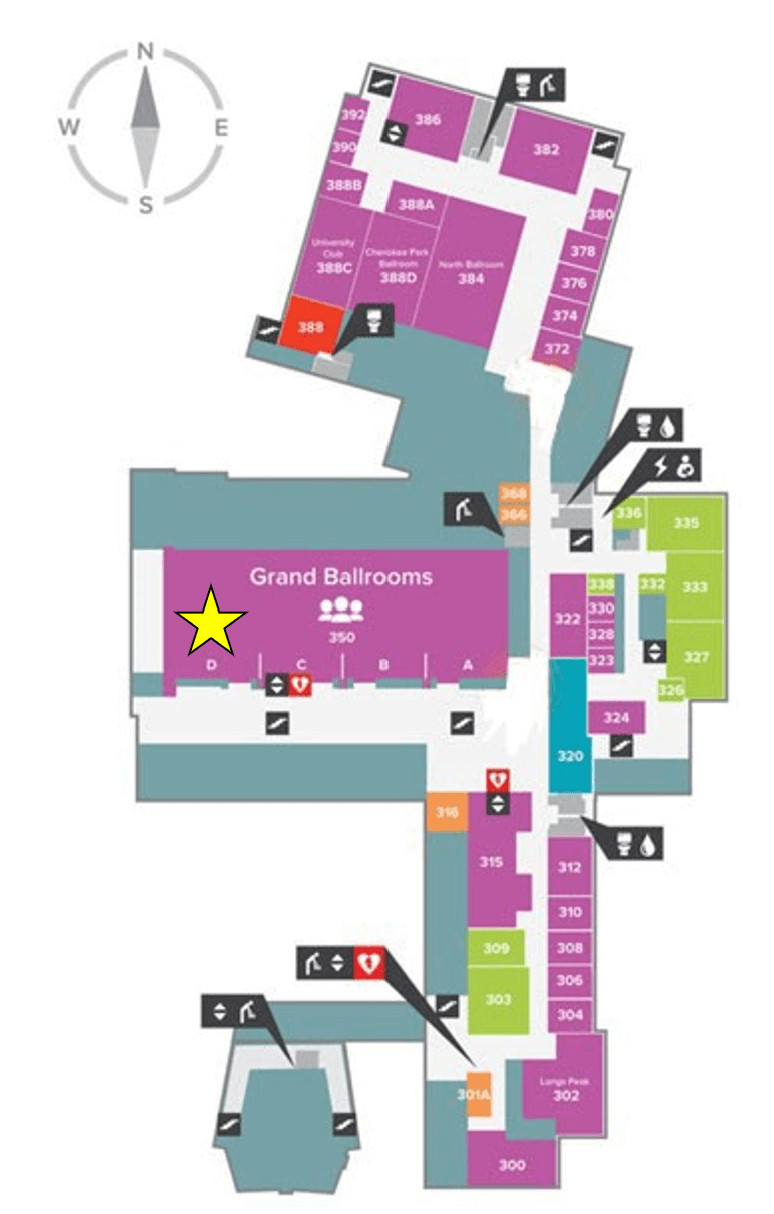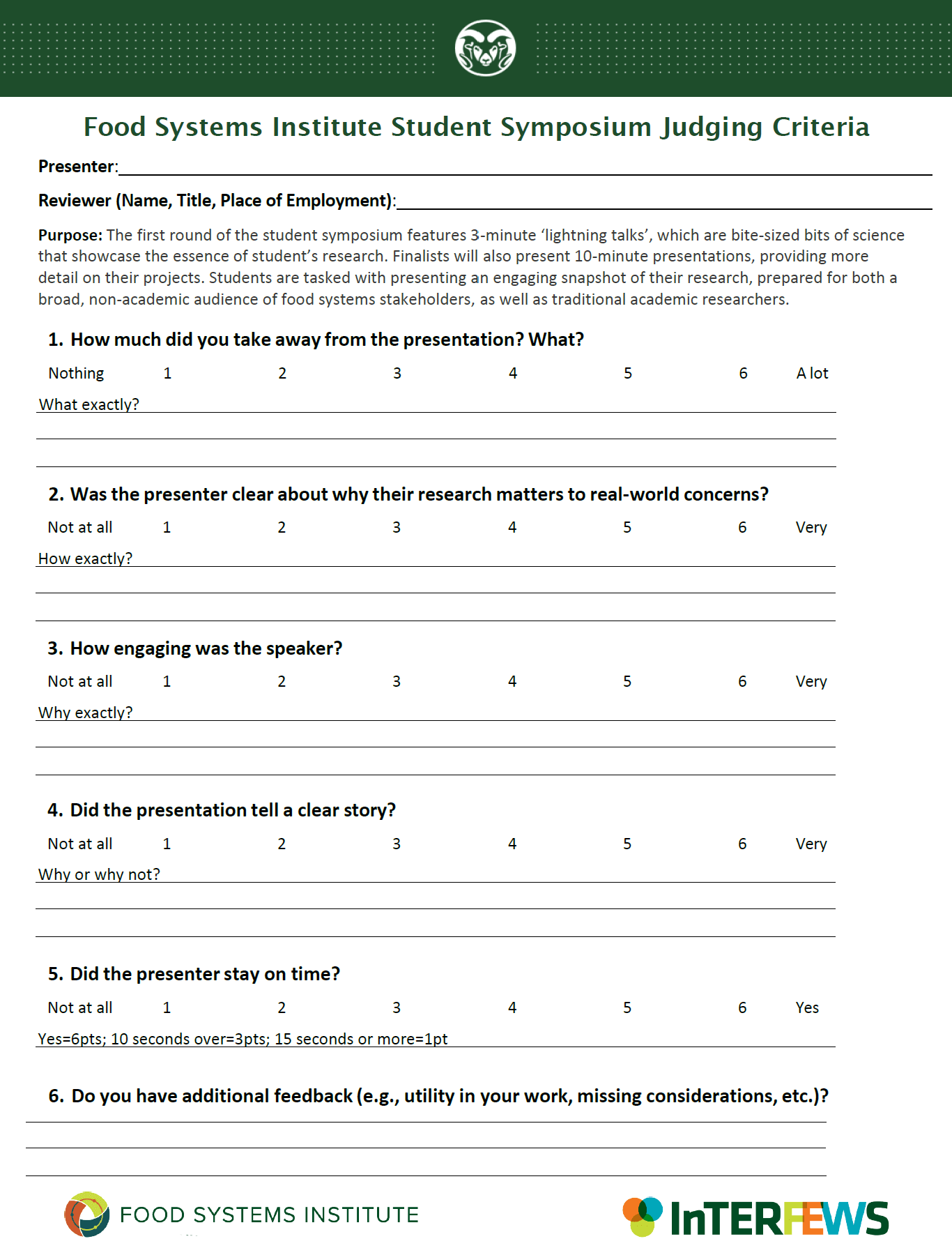Schedule
Schedule for April 26, 2023
NOTE NEW TIME: Due to the number of student presenters participating, the symposium will now go until 2pm.
DOWNLOAD AGENDA HERE
DOWNLOAD PRESENTATION ORDER & ABSTRACTS
1st Annual Food Systems Institute Student Symposium April 26, 2023, CSU LSC Ballroom D
8:30am: Registration Opens
9am: Welcome
9:15am: Faculty Panel – Meagan Schipanski (Soil & Crop Sciences), José Chávez (Civil & Environmental Engineering, & CSU Extension), Elizabeth Ryan (Environmental & Radiological Health Sciences), Kat Caswell (CSU Extension), & Michael Carolan (Sociology & FSI Co-Director)
10:10am: Break
10:25am: 3-Minute Student Presentations (Part 1)
11am: Break
11:15am: 3-Minute Student Presentations (Part 2)
11:45am: Lunch
12:50pm: Three Finalists Announced
1pm: Finalist Round: 10-minute Student Presentations
1:45pm: Winner Order Announced
1:55pm: Closing Remarks
2pm: End
Registration & Proposals
Registration & Presentation Proposals
Registration is now closed.
EXTENDED DEADLINE: Friday, March 31, 2023, by 5pm MT
Important Notes: All attendees and student presenters are required to register for this event.
Students planning to present their research at the symposium will also include their presentation proposals (title, major themes, and 1-2 sentence description) with their registration information. Abstracts will be submitted separately on the Submit Abstracts tabbed page no later than Monday, April 17th by 5pm MT. Additional abstract guidelines can be found on that page as well.
Registration & Presentation Proposals Form
The deadline has passed.
Pre-Symposium Seminar
Pre-Symposium Seminar
This event has concluded.
Deadline: RSVP to calendar invitation to seminar by Monday, April 3, 2023, by 5pm MT. If you do not receive an invitation within 2-3 days of registering as a student participant, please email Elizabeth.Plombon@colostate.edu.
Hosted in collaboration with the Graduate School and CSU Writes, a Pre-Symposium Seminar is being held for student presenters Thursday, April 6th from 12-2pm MT at the Lory Student Center in Room 312 (subject to change if larger room required). Facilitated by Dr. Kristina Quynn, (Associate Professor, Assistant Dean of the Graduate School, and Director of CSU Writes), the seminar will provide student symposium participants with recommendations and tips for preparing strong 3-minute and 10-minute presentations from their research projects, as well as the accompanying abstract and presentation slides. Although attendance is not mandatory, we strongly encourage all student participants to attend!
Abstracts
Presentations
Information for Presentations
Students will create two presentations about the same food systems-related research project for the Student Symposium: a 3-minute and a 10-minute presentation. The 3-minute presentation will provide a snapshot of your research, and the 10-minute presentation will allow for additional detail on the same project. The goal is for a student to be able to give a quick “pitch” of their research, while also understanding how to effectively communicate the right amount of detail for a 10-minute presentation to a broad audience. For more information, please view the Student Symposium Guidebook !
Students are tasked with creating both an engaging snapshot of their research, and as well a more detailed summary prepared for academic and non-academic audiences. These presentations should discuss real-world applications, advice, and future research directions.
Audience
Presentations should be prepared for BOTH traditional academic researchers and non-academic audiences (e.g., consultants/private industry, municipalities/utilities, government, and non-profit organizations working across the foody systems sector).
Focus on these four questions: What was the motivation for conducting your research? What did you do? What did you or do you expect to find? Why does it matter (real-world implications or advice)?
Please see the Resources & Templates tab for helpful presentation tips, templates, guidelines for presentation slides, and a link to the folder where you will submit BOTH SETS of presentation slides before 5pm MT on Monday, April 24, 2023.
Resources & Templates
Resources & Templates
Make sure to download the Student Symposium Guidebook which provides helpful information about the intentions, audience, and additional resources for preparing your presentations!
BOTH Presentations will follow the same general structure (guidebook provides additional details):
- Title, Name, Affiliations
- Background
- Methodology
- Major Findings
- Conclusions & Implications
Here are a few recommendations from the Nature Career Guide published on June 23, 2021:
- Start strong. In the first few sentences, the audience should know why they need to pay attention. You have a fraction of your allotted minutes to establish credibility.
- Tell a story. Whether a talk is one minute long or 20, it should be framed by a basic narrative. Start with a research question and follow up with experimental methods and results: the credibility that you established at the outset will build, and the audience can actually learn something.
- Pace yourself. It’s normal to speak quickly when the clock is ticking, but that isn’t the best way to convey complicated scientific concepts. Don’t try to fit in more words per minute; instead, find words and images that really matter.
- Keep slides simple. Some lightning speakers try to cram many concepts into each slide, but that’s a mistake. Images should be as economical as words, holding just enough information to make important points without visual overload.
- Practice. Don’t follow a script, but you should practice your talk enough to know where you’re going and how long it takes to get there.
3-Minute Presentation
Although these will not be true 3-Minute Thesis (3MT) Presentations (e.g., can have more than one slide), the purpose remains the same: effectively communicate your research without jargon within 3-minutes. There are numerous resources online for preparing 3MTs.
10-Minute Presentation
Your 10-minute presentation will provide the opportunity to give your audience more detail about your research. The trick is to not add too much detail that the story becomes convoluted, difficult to follow, and potentially uninteresting. Give us more of the HOW?, WHAT?, and WHY?
Remember to check out the Student Symposium Guidebook for additional helpful resources!
Abstract Template
All presentations are to be accompanied by an abstract for publication in the conference proceedings. The format should follow the template and instructions here:
PowerPoint Slides Guidelines & Template
Participants must adhere to the following guidelines:
- Contestants must have a NAME slide – place this slide BEFORE your content slide(s).
- Prepare slides in 16:9 aspect ratio.
- Naming conventions for presentations:
- LastName_3Min_2023
- LastName_10Min_2023
- BOTH presentations should be uploaded to the folder linked below as MS PowerPoint files (not PDFs).
- BOTH SETS of presentation slides must be uploaded to their corresponding folders no later than 5pm on Monday, April 24, 2023 (you will NOT be allowed to upload your slides right before you present!).
Please copy and paste the links below.
- 3-Minute Presentations: https://colostate.sharepoint.com/:f:/s/FoodSystemInstitute/Ej-8sN-YIBZDlv78czmaGyEBXLjr7vYWIv7_tmamgtzzqg
- 10-Minute Presentations: https://colostate.sharepoint.com/:f:/s/FoodSystemInstitute/EuQzwahQvvVHni5DUrnR6r0BRkmZh0d8xZ9e12GW6gsyAg
Though not required, students may consider using the templates below to organize their presentations. While there is no limit to the number of slides you may present during your 3- and 10-minute presentations, please keep your slides simple and follow the tips provided in the Student Showcase Guidebook!
Evaluation Form
Awards and Eligibility
Presenter Eligibility & Awards
Those interested in participating in the Student Symposium must:
- Be currently enrolled at CSU;
- Be either a graduate (Masters or PhD) or upper-level undergraduate (at least 90 credit hours completed) student;
- Adhere to all posted deadlines (listed below);
- Register and submit a presentation proposal;
- Submit an abstract to finalize their participation; and
- RSVP to calendar invitation for the April 6 Pre-Symposium Seminar.
Deadlines:
- Register as a student participant and submit presentation proposal by Monday, March 31, 2023, by 5pm MT.
- RSVP to calendar invitation for April 6 Pre-Symposium Seminar by Monday, April 3, 2023, by 5pm MT.
- Submit a properly formatted abstract by Monday, April 17, 2023, by 5pm MT.
- Upload BOTH sets of slides (3-minute and 10-minute presentations) by Monday, April 24, 2023, by 5pm MT.
Prize money will be awarded to each of the three student participants who make it to the final round:
- First Place = $500
- Second Place = $250
- Third Place = $100
*Please note that due to university guidelines, actual cash is not allowed to be distributed at the event. Students who also CSU employees will have their prize money directly deposited into the same account their paycheck is. Students who are not CSU employees will have their prize money deposited into their student accounts.
General Info
General Symposium Information
Dress Code
There is no official dress code for this event. For presentation participants, we recommend dressing in anywhere from business smart casual to business casual to business attire (difference between the three can be viewed here). Participants should dress in a way that creates a positive, professional impression on their audience, as feeling uncomfortable in your one’s attire can impact presentation style.
Lory Student Center, Ballroom D
All symposium activities will take place in Ballroom D of the CSU Lory Student Center (LSC). Ballroom D is located on level 3 of the LSC, identified with a star on .

Parking
Visitor Parking
All vehicles parked on campus must have a valid CSU parking permit or park in designated hourly parking spaces and pay at a pay station!
Around the Horn is a free CSU shuttle that connects to most visitor parking lots with a bus that loops every 10 minutes from 7 a.m. – 6:40 p.m. Mondays through Fridays.
Parking Permits
- Hourly permit: Hourly parking on campus is $2. When you arrive in a lot with visitor parking, have your license plate number ready to enter into our hourly pay machines or you can download and use the Park Mobile app to pay by mobile phone. You can pay by credit card for the amount of time you wish to park. Your license plate number will serve as your permit. For more information visit short-term parking.
- Daily permit: A daily permit can be purchased online or at Parking and Transportation Services, located in the Lake Street Garage at 1508 Center Avenue.
Where is the easiest place to park on campus for visitors?
Visitor parking permits are available for the areas listed below, also noted on the university’s parking map (PDF and online), and connect to Around the Horn to get you around campus (Note: we recommend parking in the Engineering #310 below, as it is right next to the LSC):
- Moby Lot #195
- Green Hall
- Engineering #310
- Ammons Hall # 315
- Administration #349
- MAX at University Station #440
- Lake Street Garage
- Voss Veterinary Teaching Hospital
- Research Blvd #740
Visitor parking near the center of campus:
- Hartshorn Health Center #412
- Morgan Library #425
Enforcement
Parking on campus is monitored through a virtual permit system that scans your license plate. Your license plate is linked to your parking permit.
- Vehicles must be parked so that a valid license plate or temporary registration is clearly visible from the drive lane.



